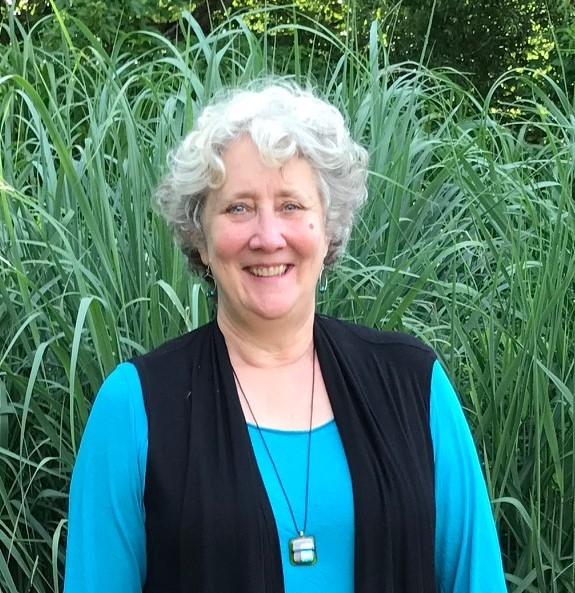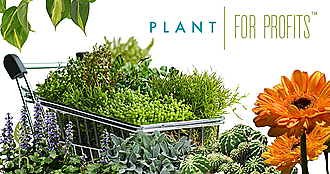Women in Horticulture Series: Jill Hoffman, Hoffman Nursery
In my Women in Horticulture Series, I interview green industry professionals about their experiences as a woman, and harvest advice for success for other women in the industry.
Name: Jill Hoffman
Profession: I was trained in a completely different field (Ph.D. Toxicology, studying chemically induced cancers and tumor suppressor genes) and I’m a long way away from that now! Maybe entrepreneur?
Company/Position: Hoffman Nursery, co-owner
Age: 58

Q: Where and how did you start in your career in Horticulture?
When I was working on my Ph.D., I met my husband, John. We were next door neighbors and he was my landlord. He had his own landscaping business at the time. I started by helping him do his accounting and office work after a day at my “real” job. After we married we bought the nursery property. After my postdoc, I decided that laboratory research was not my calling. We transitioned from landscaping to the nursery business over the next decade.
Q: Where are you now in your career in Horticulture? Do you consider yourself a leader?
Not sure exactly where I am in my career in Horticulture. I am not really a plantsperson. I love plants and I have watered (and killed) many a plant and pulled many a weed over the years, but that is not my expertise. My role at the nursery is on the business side including strategic planning, culture development and all the financial segments of the business.
I think that I have helped to create a vision for the future of Hoffman Nursery and that our employees, customers and vendors are inspired by this vision. While we will always have improvements to make, we are happy that our employee engagement is above the US average and that they are relatively happy working in the Hoffman Nursery environment. Our product is highly valued by our customers because we can give them more than just a high-quality plant. We have worked hard to develop our role as an expert in grasses. I consider myself a leader, but it helps being a leader of a fantastic team. The fantastic team is what actually makes it happen.
I was going to say that I am heading toward the end of my career in the green industry, but I still have a lot to do in moving our nursery and our industry forward. The horticultural industry is rapidly changing. To make the change positive, we encourage new folks to become a part of this industry through mentoring, scholarships, internships, student work days at the nursery, sponsoring competitive events with NALP and other things. We are also spending a good deal of our time, energy and effort on marketing the relevance of what we do for our customers and their customers. We need to remain at the forefront of the general population’s mind by showing them that horticulture is a necessity on multiple levels, such as erosion control, stormwater management, human health benefits, etc., and not just a pretty front yard for the neighbors to enjoy.
Q: What accomplishment, that you specifically have contributed to your professional success, are you most proud of?
I am most proud of the fact that Hoffman Nursery has been in business for over 30 years despite economic downturns and other problems along the way. We have finally done things internally that should have been done years ago, including defining and formalizing our core values and core purpose to help guide our employees and others to know what to expect from Hoffman Nursery. I recently graduated from Dr. Charlie Hall’s and Texas A & M’s Executive Academy of Growth and Leadership Program which truly helped me to guide the Nursery to focus on what is important. Through this program we developed a one-page strategic plan (it used to be pages and pages!) identifying what we need to do to stay in business for another 30 years. Being a participant of this program has added credibility to my role here at Hoffman Nursery.
Q: How would you describe your career path, specifically as a woman in the green industry; specifically, did you experience any challenges (for flat out discrimination or even harassment – if you feel comfortable addressing it) you felt were unique to you as a woman?
I haven’t experienced any real challenges because I am a woman. I don’t know if it was truly discrimination, but the green industry has been such a male-dominated industry for so long that sometimes it seems hard to get your voice heard. This has also been true when dealing with banks and other institutions.
Up until the last few years, my role at the nursery was mainly working in the office or managing employees. In the early nineties when we were small and growing, I went to the tradeshows with my husband. This didn’t last long since I was forced by constraints to stay home with the children (a boy, a girl and the nursery!). At the time, it was a challenge dealing with all of it at once when John was at the tradeshows, delivering plants, or on sales trips. I’m glad those times are over – on to new challenges!
Q: If such challenges did exist along your path, how did you overcome…or if not totally overcome…how did you persist through these challenges and succeed despite them? Can you describe specific tactics you employed that helped you be empowered?
I think that the biggest thing that has helped (and I am still learning) is that I can’t do it all myself. Hiring a responsible, dependable and smart team has been the key. Surrounding yourself with a good team is an absolute necessity when times are tough.
In addition, it’s important to always look beyond your own walls. There are a lot of ideas out there that can be used in your own space. Being open to new ideas and willing to change (HNI Core Value: Improve and Adapt) is important if you are going to succeed long term.
I think that being a part of the EAGL helped me a tremendous amount. All the mentors are open to helping everyone in their businesses. Kellee O’Reilly, Chief Experience Officer and Director of Doing at Monkey Bar Management and a long-time friend to the green industry, understands and is vocal about women’s roles in the green industry and believes that we all need to become a bigger part of the picture. She is an inspiration.
Q: In what areas of business operations, management, and co-worker communications do you see opportunities for improvement when it comes to work parity for women?
In our business, we are an equal opportunity employer. We currently have 54% men/ 46% women employed here. This percentage of men to women is roughly reflected both in our Customer Experience and our Operations Areas of the nursery. We hire employees based on their abilities, skills, desire to learn and whether they are a culture fit. The culture fit is the key. Our culture is one of respect (HNI Core Value: Show Respect). We work hard to make sure that all employees have a pleasant environment in which to work. On that front, we ensure that everyone Is well trained in our no harassment policy as well as all our core values.
Businesses need to have the right mindset and recognize the value a person can bring to the organization. It cannot be a quick fix. Changes take time, but they need to happen.
Q: What future goals do you have for yourself as you continue your career in the green industry?
I intend to continue to live by the core purpose and core values that we have set for our company. Firmly establishing these values and living by them is very important to me.
Core Purpose: To promote better living through plants
I hope to realize this purpose in the plants we grow and by how we help others learn that plants are important to our world. I love the promotion by National Initiative for Consumer Horticulture, #plantsdothat. That embodies the essence of the message we need to get out.
I think that more needs to be done to help the industry itself understand how important plants are to life on earth. There are still many nurseries that don’t realize their own value. I’m concerned that without this clearly stated purpose, many in the green industry will not continue to thrive. It is important that everyone realize the significance of plants and that they need to be paid a fair price for their valuable products. We still need to convince ourselves, the industry, that the needs of the consumers have changed and are changing, and we need to keep up .
On a personal note, it is important to me that we set up the nursery for success after my husband and I retire (no plans yet). This means that our team, processes and policies are in place and can weather changes in the economy, the climate and the industry. We want Hoffman Nursery to be a leader in moving the industry forward.
As part of this goal, we want to help others in the industry to take an active leadership role in the industry by offering them opportunities to network and to learn. This can be by bringing employees and students to conferences and tradeshows, having them come to nursery for tours or teaching classes at the local schools, and internships at the nursery. In all these encounters, we reinforce the idea that we need to be promoting the industry and encouraging others to be a part of it.
Q: Do you mentor women in the industry, and if so how?
Yes, I try to mentor women in the industry – mostly our employees and students. The biggest way to do this is by offering employees opportunities to attend conferences and trade shows for learning and networking opportunities and offering students opportunities with internships here at the nursery. It is important to get them involved in the industry whether it is giving them a role on a site committee for an upcoming conference, or a chance to speak to others outside the nursery about what they do. It helps to share with them what is going on in the hort industry and get them excited.
Q: Do you belong to professional organizations or networking groups (not limited to green industry) if yes, which ones do you find to be the most professionally effective– especially as a woman?
I think that the most important groups to which I belong are the AmericanHort, the North Carolina Nursery and Landscape Association and especially the EAGL group. I am also involved with the GROW Summit (in conjunction with Greenhouse Grower Magazine). This is a group of industry professionals who meet and discuss the major topical issues in the industry and ways to address and solve those problems to help the industry.
If I had the time and were aware of other organizations or networking groups suited to me, I would do more. I think that it is very important, even essential these days, for people just starting in the industry to be more involved. It is a big part of their culture/life.
Q: Name one think that you do to stay relevant in the industry as times, trends, and technology change?
I keep up with the e-newsletters and magazines within the industry for trends and technology, Harvard Business Review for updates on the economy and business news, and e-newsletters from several Human Resources groups to keep up with employee management practices.
Q: What piece of wisdom would you like to pass on to:
- Women of your own age in the workforce
- Women younger than you who are coming up in their careers
I’m not sure if I can offer women of my age any pieces of wisdom. I figure that if they have been in the business this long – they have it under control!
As far as younger women in the business – I think that you can be successful and successful early in your career if you get out there and network, take a chance, and work hard. Also, learn, learn, learn! (another HNI Core Value: Empower through Learning). People are always willing to help those who show initiative, have an interest in a project or a dream and have done their homework. You must work for it and make it happen.
Thanks Jill!


